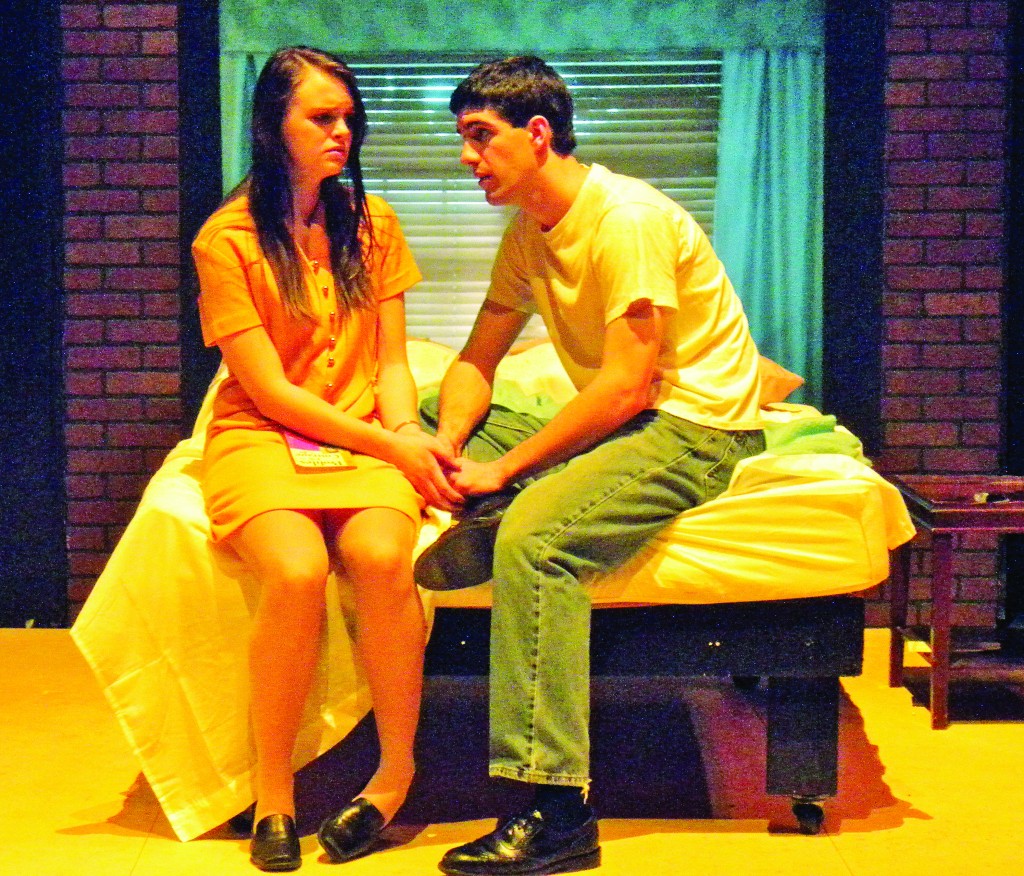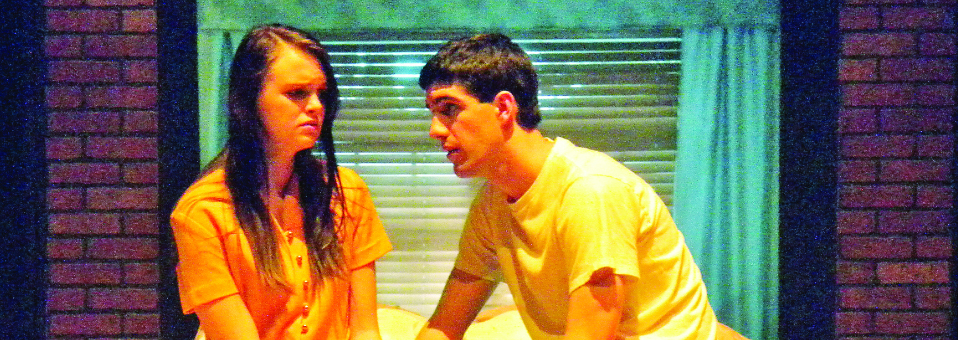Soland’s ‘The Sniper’s Nest’ presents compelling debut

Lisa Soland’s ‘The Sniper’s Nest’ detailed the affair between Judyth Vary Baker, played by
Caitlin Campbell, and Lee Harvey Oswald, played by Walker Harrison.
In “The Sniper’s Nest,” Lee Harvey Oswald asked, “Who taught you life was easy? Who did you that injustice?” This seems to be the running theme of the dramatic work, which premiered in the Haslam Family Flex Theatre in the Clayton Center for the Arts on Nov. 29. Written by Lisa Soland, adjunct professor of theater at MC, the play takes inspiration from the Judyth Vary Baker’s book, “Me and Lee: How I Came to Know, Lose and Love Lee Harvey Oswald.”
MC junior Caitlin Campbell played Baker, and senior Walker Harrison starred as Oswald. Playwright Lisa Soland also directed the play, and junior Rachel Jarnagin acted as the Assistant Director. The play opens innocently enough at a Louisiana post office, where Baker is inquiring as to whether a letter has been delivered. It is at this moment we meet Oswald, which Harrison plays as confident and self-assured. Baker came to Louisiana to perform cancer research, young and eager to grow.
After a short discussion of their mutual knowledge and interest in Russian, Baker agrees to play chess with Oswald, and a whirlwind romance begins, that is littered with cancer research, conspiracy, lies and uncomfortable truths. There is conflict immediately, and not just in the play’s spoken content. Harrison’s Oswald is charming, but with an edge. His admitted violent behavior and revelations of temper give a brittle tone to his occasional bombastic outbursts.
Oswald appears philosophic at times, and the edge becomes more apparent and disconcerting as he swings from charming Baker to growing angry and forcibly wiping her lipstick off, then becoming romantic again in a dizzying time. However, a strength about his portrayal of Oswald of the play is that one can never be certain about the character. Does he believe his own story, or is he desperately trying to convince himself and others? Does he truly love Baker, or is she a tool for his current intended work? What are his intentions, and how much of the entire ordeal is his fantasy, and how much of it is real? Campbell’s Baker is also well executed. Campbell’s portrayal starts out as exuberant, an excellent blend of naiveté and cheek, and slowly wears down.
There are signs that Baker herself might need Lee as much as he seems to need her, and that the girl might be a bit broken because of it. This disintegrates into what is uncomfortably like a mental breakdown as time goes on, and much credit should be given to Campbell for accurately portraying the nervous fragmentation. Baker wrestles with the question of whether all that is happening is right, fair or even decent, an evident theme of the play.
Ultimately, both actors pull the audience into wondering exactly whose fantasy they are viewing. The play was sometimes fastpaced, and required careful attention to dialogue. Since there are only two characters, anyone else who ‘appears’ is represented only by their name and the reputation. This writing can sometimes become confusing when names are so frequently used and important to the plot. The scenery was static and simple.
As the play revolved around the short time Baker and Oswald were together, the majority of the scenes took place in their living quarters, and the continued presence of the same setting provides an anchor to what becomes an increasingly frenetic and uncertain situation for the characters. The music was selected well, with familiar pop hits of the time cleverly placed to between scene transitions, such as “Our Day Will Come”, by Ruby and the Romantics.
The lighting was dim at times, and bright at others. It was especially effectively used during Judyth and Lee’s last phone call, as Lee and Judyth’s faces were thrown into sharp shadows and the spotlight emphasized their emotions. The script was full of “don’ts” from Oswald. He repeatedly told Baker, “Don’t apologize for being smart,” “Don’t ask questions” and “Don’t wear that stuff.” It was the emphasis of these “don’ts,” which made the questions asked during the play the most compelling, especially in respect to the relationship of these characters and what their actions could imply for the United States as a nation.
With historical information, a fastpaced script and satisfying acting, Soland’s new play was a fine selection for the MC Theatre’s fall season.

